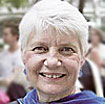Commentary on John 14:8-17 [25-27]
Joseph is in love with Maria.
This sounds like a biblical story, but it is not in the Bible. These two young people live in Mary Gordon’s story, “Temporary Shelter.” Joseph has loved Maria since the two of them were children and his mother went to work for Maria’s father. He is drawn to Maria’s Jewish roots, even though Maria and her father have left that tradition behind. And she is drawn ever more deeply into the life of the Roman Catholic convent near her home. Now, Joseph was losing her. He remembered the day when it all became clear:
That day in the convent she was far away from him, and knew it … He saw Maria rise up on the breaths of the face-less nuns, rise up and leave him, leave the body she loved that did always what she told it, that could dance and climb or run behind him and put cool hands over his eyes and say, “Guess who?” as if it could be someone different. But in the chapel she rose up and wanted to leave the body life that she had loved. Leave him and all their life together.1
Maria was not the only one who wanted to leave the body life she had loved. This longing is at least as old as the Greek philosophers who desired to get beyond the weight of matter to live in the realm of pure spirit. Many religions, and perhaps voices within all religions, claim that life-with-God can only be attained by being freed from the bonds of earth and the body. To be with God is to be in some other place, if not geographically, then in a spiritual trance, an out-of-body experience where we will be closer to God and farther from this earth.
Jesus seems to begin there in John 14: “In my Father’s house there are many dwelling places. If it were not so, would I have told you that I go to prepare a place for you? And if I go to prepare a place for you, I will come again and will take you to myself, so that where I am, there you may be also.” We cherish this strong image of closeness — “where I am, there you may be also.” But how can we rise above the grass, above the living room chair, above this tired or tempting body-life? How can we enter the pure life of the Spirit to be with Jesus?
Before we let go of earth, Jesus has more to say. We know this chapter is the beginning of Jesus’ farewell discourse, his last lecture series to his disciples. Jesus moves beyond his opening promise to say some startling things: “Very truly, I tell you, the one who believes in me will also do the works that I do and, in fact, will do greater works than these, because I am going to the Father” (John 14:12.) If anyone other than Jesus had said those words we would call it blasphemy. Greater works than Jesus? How can that be?
Jesus is not talking about heaven here; he’s talking about earth. A bit later in this same chapter Jesus says, “I will not leave you orphaned; I am coming to you. In a little while the world will no longer see me, but you will see me; because I live, you also will live.” Jesus will not bend down to wash their feet; they will wash each other’s feet. They will remember that night when he took the basin and towel, when he bent down and surprised them saying, “Guess who?”
Jesus promised to be present with the disciples in a different way: “I will ask the Father, and he will give you another Advocate, to be with you forever.” But forever wasn’t postponed to a time after death; forever included life on this earth. The Spirit of truth, the Advocate will come here. Jesus’ presence will be deeper than memory and closer than heaven. Jesus will forever be messed up with this body-life, this earthiness which some tell us to discount, even disdain.
Though this promise is surely personal, it is primarily communal. These words are Jesus’ last words to the community of disciples that would become the church. Maybe if the church were pure spirit, it would be more satisfying. In his book Costly Discipleship, Dietrich Bonhoeffer wrote about Christ’s body, the church: “The body of Christ takes up space on the earth,” he said — as buildings take up space, also cars, dirt, flowers, rocks, skateboards, and people. Then Bonhoeffer went on, “A truth, a doctrine, or a religion need no space for themselves. They are disembodied entities … that is all. But the incarnate Christ needs not only ears or hearts, but living people who will follow him.” The body of Christ takes up space on the earth.
Pentecost is often called “The Birthday of the Church.” Those of us who are part of the church know we are not what Jesus called us to be. We spend too much and share too little; we judge too many and love too few; we wait too long and act too late. We’ve heard people say, “Show me a church where ministers aren’t self-serving, where hypocrisy has been purged away, where love is genuine, and I’ll become a member.” They’ll wait a long time, for such a church takes up no space on this earth.
Jesus spoke these words to his disciples before he went away from them. This is Pentecost in John’s Gospel. The body of Christ must claim space on the earth. We who dance and climb, who run and get knocked down, we who lie on the grass and sit watching the late-night news — we are not alone. The Spirit of truth, the Advocate comes, surprising us at every turn, saying, “Guess who?”
Notes:
1 Mary Gordon, “Temporary Shelter,” in Temporary Shelter (New York: Ballentine Books, 1988) 17-18.


May 15, 2016